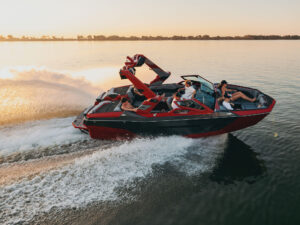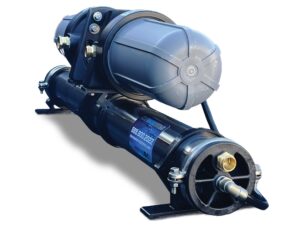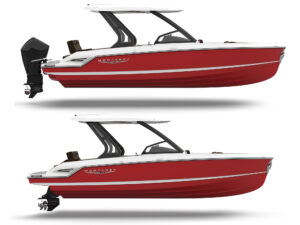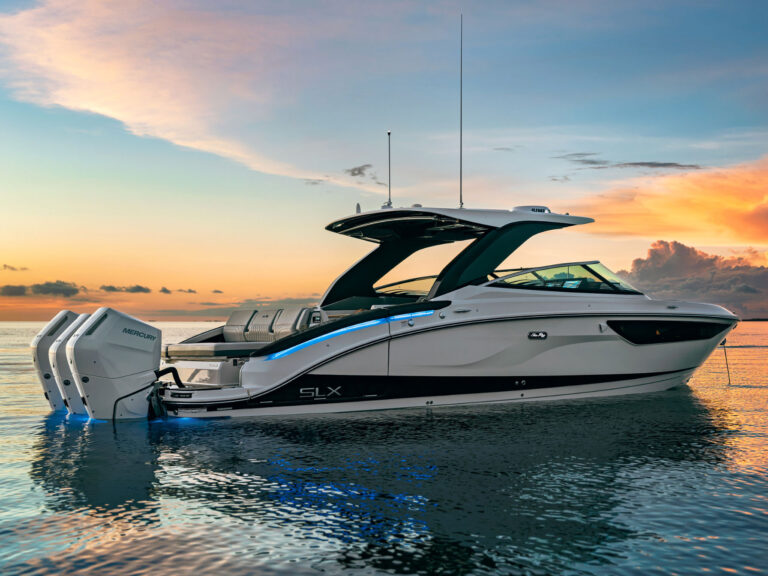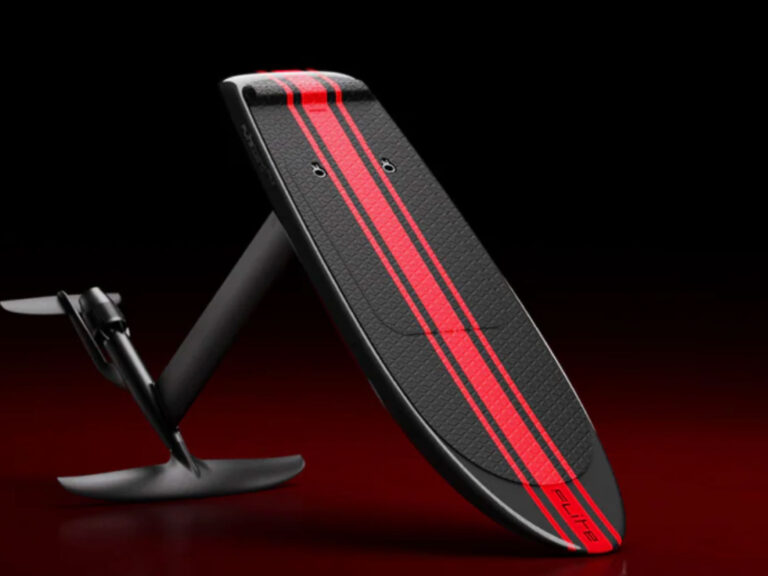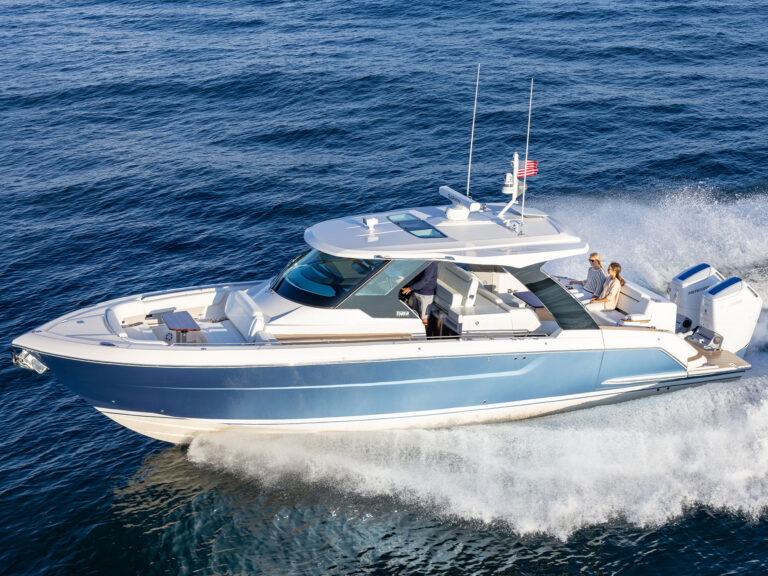There is more than one way to skin a cat, and in wakeboarding, there are two ways to fill a sack—a ballast sack to be exact. Many boats are built with integrated ballast tanks or sacks and permanently mounted reversing pumps.
Tap “fill” and they fill. Tap “empty” and they reverse the flow overboard. Then there’s the down-and-dirty way: Drop a portable pump, which is plugged to a 12-volt receptacle, overboard attached to a hose attached to a removable ballast sack, and fill away. When it’s time to pump out the ballast, hook the pump to the ballast tank and drop the end of the hose overboard.
Fixed-Mount Reversing Pumps
Reversing pumps are mounted to a bulkhead or flat surface in the bilge and above the waterline to avoid immersion and prevent backflow, should the pump impeller fail and allow water to pass. One barb on the pump is attached to a through-hull fitting below the waterline; the other is attached to the ballast tank fill port. If there are multiple tanks, as is normally the case, a diverter valve directs the water to the tank to be filled. Some diverter valves are manual, and some are activated with a switch. The pump has the ability to run two ways, pumping in or pumping out, based on the switch selection.
Portable Ballast Pumps
These simply designed systems use a 12-volt pump powered via a 12-volt receptacle and connected to a hose. On some, a friction fitting holds the output hose to the ballast tank fill port and the waterproof pump is dropped overboard. When the tank is filled, it’s capped, and the pump hose is connected to the next bag. To drain the bags, the hose is placed on the intake side of the pump and, again, the pump is dropped over the side of the boat. To make the pump start draining, it may be necessary to hold the pump below the top level of the ballast tank to prime the pump, then quickly hold it overboard.
Maximum Flow Capacities
A pump’s ability to move water is measured, usually, in gallons per hour. Wakeboarders want to know how many “pounds per minute” are added to the boat. Either way, that capacity figure is dependent on the power of the electric motor, usually measured in amps, the size of the impeller, shaft and motor, and the diameter of the water-supply inlet and overboard outlet. A higher-capacity pump will require more electricity in amps to do the job. The higher amperage the pump draws, the higher the wire gauge (thickness) needs to be to carry the current. Also, the longer the distance from the pump to the battery, the heavier the gauge needed to combat the wire’s resistance to the flow of electrons.
Here are five outstanding options, and a study of their specs and capacities.

Ronix 8.3
This pump represents the fastest way we’ve found to fill ballast in a portable pump—and the most economical. Drop the pump in the water, connect the 12-volt power plug, and lock the hose into the ballast bag. Ballast can be added at 493 pounds per minute, according to specifications (61 gallons per minute). The pump’s fittings are designed to mate only with co-branded bags.
- Best Price: $159.99
- Capacity: 3,700 gph
- Flow at Lift: N/A
- Voltage: 12
- Amp Draw: 20
- Fuse: 12 amps
- Run Dry Protection: Yes
- Ignition Protected: Yes
- Body Materials: ABS Plastic
- Impeller: Nylon
- Seal: N/A
- Ports Internal: None
- Ports Outside: 1.5″
- Motor Magnet: N/A
- Enclosed SS Shaft: Yes
- Bearings: N/A
- Weight: 11 lb.
- Dimensions: 15″ x 13″ x 7″
- Website: wakemakers.com

Johnson Pump Talulah 13.5 GPM Ballast Pump
Johnson builds this pump with a durable oil-impregnated impeller that can resist short run-dry periods and thermal protection to shut down the pump if water is not moving through it, giving the ultimate protection against burned-out pumps. It can move 108 pounds of ballast in
a minute.
- Best Price: $189.99
- Capacity: 810 gph
- Flow at Lift: 1’0″
- Voltage: 12
- Amp Draw: 14
- Fuse: 25 amps
- Run Dry Protection: Thermal overload protection, plus oil-impregnated impeller is lubricated against short dry-run periods
- Ignition Protected: SAE J1171/ISO8846
- Body Materials: Bronze
- Impeller: Oil-impregnated polyurethane
- Seal: Lip type
- Ports Internal: 1/2” I/D threaded insert
- Ports Outside: 1″ barb
- Motor Magnet: Permanent
- Enclosed SS Shaft: Yes
- Bearings: Stainless-steel ball bearings
- Weight: 6.6 lb.
- Dimensions: 8″ x 4.72″ x 3.54″
- Website: wakemakers.com

Johnson Pump Talulah HF 30 GPM Ballast Pump
This is Johnson’s most powerful reversing pump to fill or drain ballast tanks. It can pump 30 gallons per minute at the 1-foot head, adding 240 pounds of ballast to the boat per minute. It also sports an oil-impregnated polyurethane impeller and thermal protection to stop pump burnout if left on without water flow.
- Best Price: $244
- Capacity: 1,800 gph
- Flow at Lift: 1’0″
- Voltage: 13.6
- Amp Draw: 25 pumping/45 dry
- Fuse: 45 amps
- Run Dry Protection: Thermal overload protection, plus oil-impregnated impeller is lubricated against short dry-run periods
- Ignition Protected: SAE J1171/ISO8846
- Body Materials: Bronze
- Impeller: Oil-impregnated polyurethane
- Seal: Lip type
- Ports Internal: N/A
- Ports Outside: 1.5″ O/D threaded
- Motor Magnet: Permanent
- Enclosed SS Shaft: Yes
- Bearings: Stainless-steel ball bearings
- Weight: Approx. 10 lb.
- Dimensions: 9.1″ x 5.12″ x 5.24″
- Website: hodgesmarine.com

Jabsco Ballast Puppy 18220
A lower-capacity pump for smaller sacks and vessels with limited amperage to power it, the pump is self-priming at 4 feet and capable of moving 80 pounds of ballast a minute, or 600 gallons per hour. It requires a three-pole fill-drain off-switch, sold separately.
- Best Price: $204.57
- Capacity: 600 gph
- Flow at Lift: 4’0″
- Voltage: 12
- Amp Draw: 12
- Fuse: 20 amps
- Run Dry Protection: Oil-impregnated impeller is lubricated against short dry-run periods
- Ignition Protected: ISO 8846
- Body Materials: Bronze
- Impeller: Oil-impregnated polyurethane
- Seal: Lip type
- Ports Internal: 1/2” threaded internal
- Ports Outside: 1″ barb
- Motor Magnet: Permanent
- Enclosed SS Shaft: Yes
- Bearings: Stainless-steel ball bearings
- Weight: 6 lb.
- Dimensions: 3 5/8” x 7 1/8” x 4 3/4“
- Website: hodgesmarine.com

Jabsco Ballast King S10372
Self-priming at 4 feet of head, this powerful pump has an oil-impregnated polyurethane impeller that protects against short periods of dry running, if you forget to turn the pump off while draining the sacks. It is ignition-protected for safe mounting in the engine compartment. The reversible pump requires a three-pole switch for fill, off and drain settings.
- Best Price: $250
- Capacity: 660 gph
- Flow at Lift: 4’0″
- Voltage: 12
- Amp Draw: 19
- Fuse: 25 amps
- Run Dry Protection: Oil-impregnated impeller is lubricated against short dry-run periods
- Ignition Protected: ISO 8846
- Body Materials: Bronze
- Impeller: Oil-impregnated polyurethane
- Seal: Lip seal
- Ports Internal: 1/2” threaded internal
- Ports Outside: 1″ barb
- Motor Magnet: Permanent
- Enclosed SS Shaft: Yes
- Bearings: Stainless-steel ball bearings
- Weight: 7.5 lb.
- Dimensions: 3 5/8” x 7 1/8” x 4 3/4“
- Website: boatid.com

